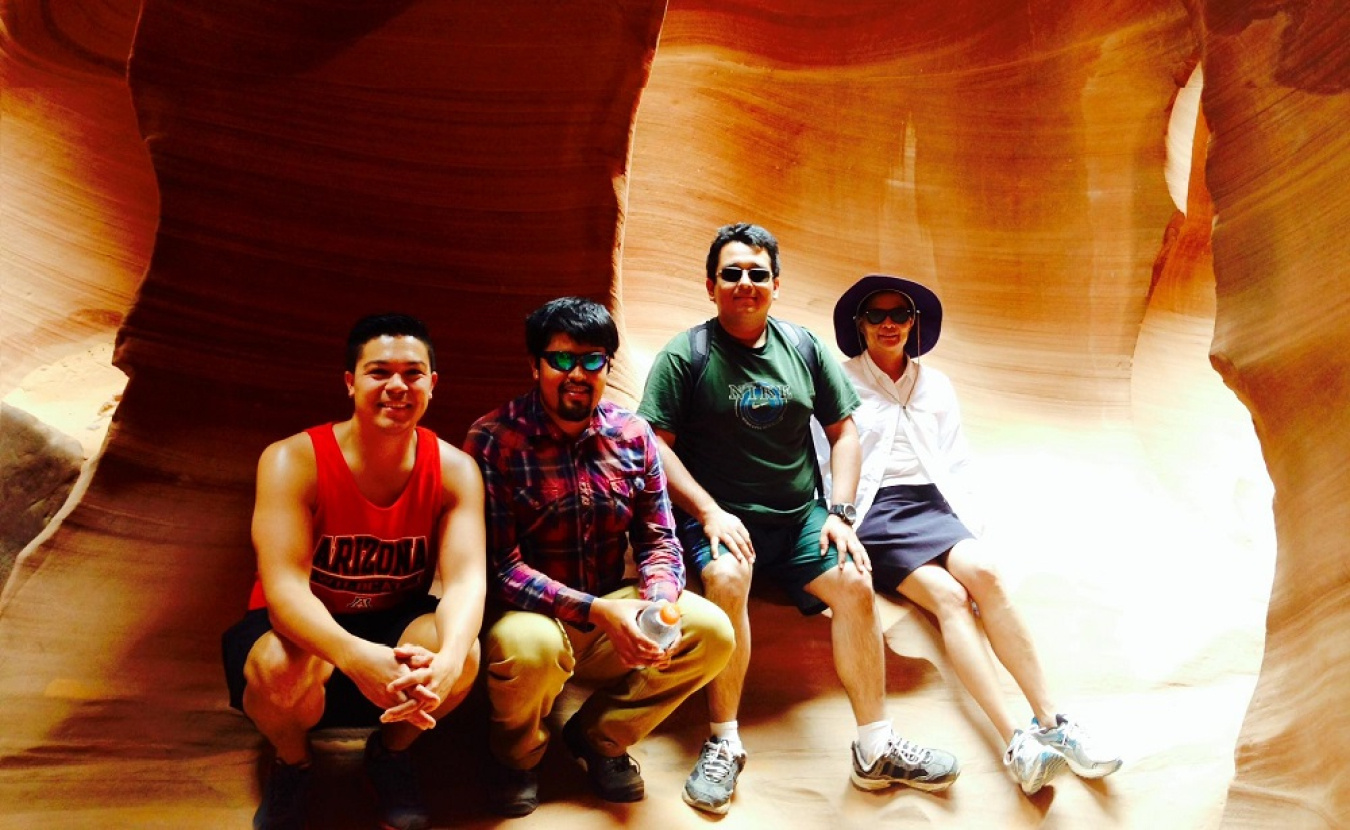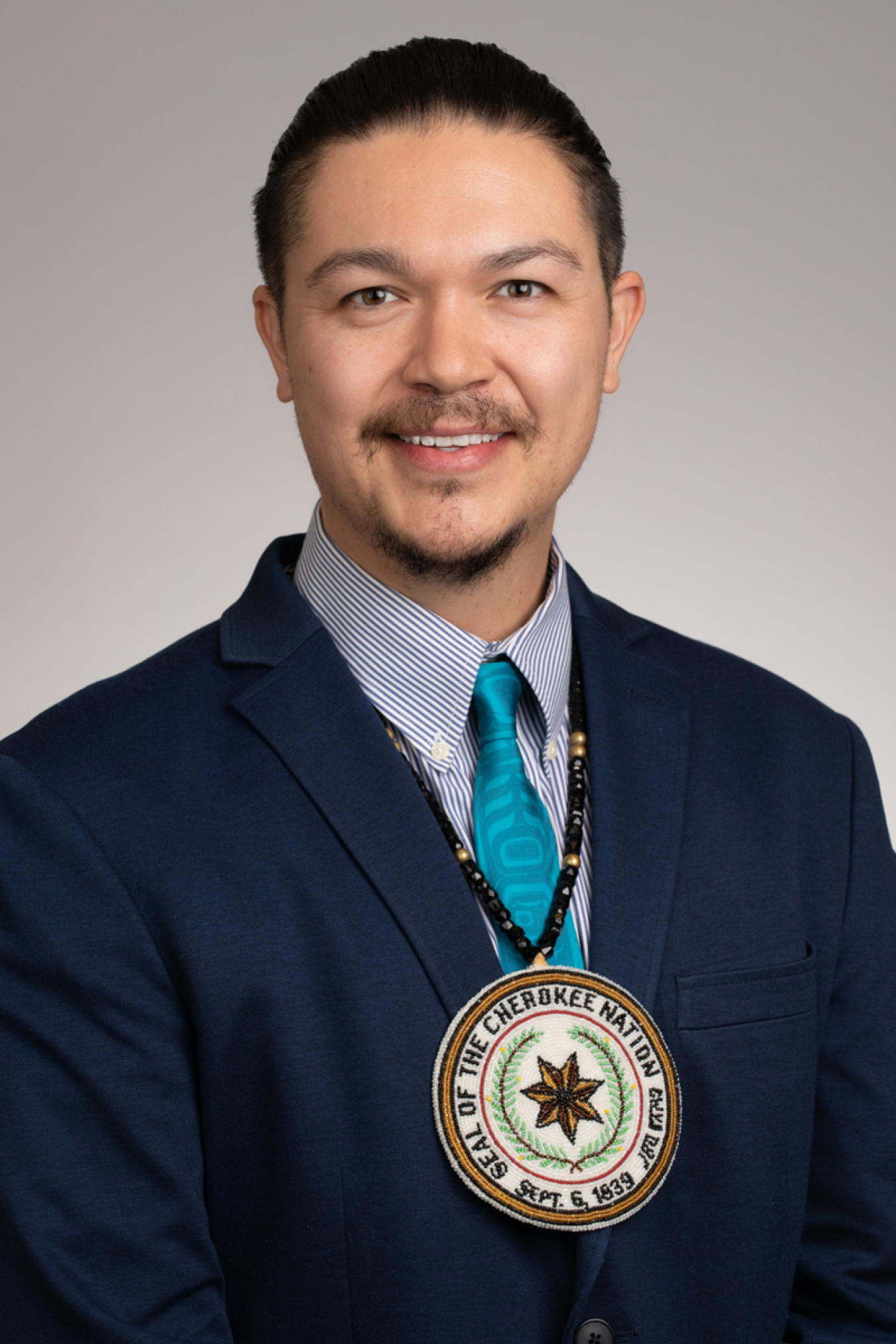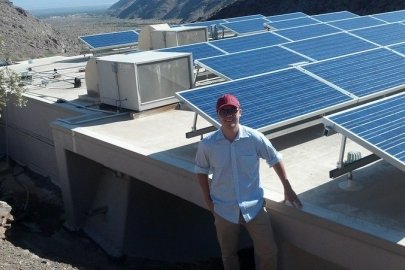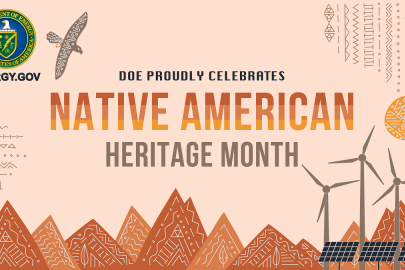This guest blog by DOE Tribal Energy Program Intern Tommy Jones is the second in a three-part series highlighting the experience of the college stu...
Office of Indian Energy Policy and Programs
September 17, 2014
Sandia/Tribal Energy Program 2014 summer interns Thomas Jones, Len Necefer, and Aaron Cate, and their supervisor and mentor Sandra Begay-Campbell. Photo from Thomas Jones, Sandia National Laboratories.
My internship with the Tribal Energy Program has directly served my desire to learn about and understand renewable energy development in Indian Country. The research I have conducted, along with fellow intern Len Necefer, has focused on addressing the gap between the significant renewable energy resource potential that Native nations have and the ability to bring this energy to market and to the benefit of tribal communities. This involved an in-depth analysis of the significant barriers that impede renewable energy development on tribal lands, including surveying experts in the field of Indian energy both at the tribal and federal government levels representing multiple Tribes and four federal departments.
Our study fills a gap in previous research, which has not effectively captured the scope of the barriers that Tribes must overcome and the extent of their impact on successful implementation of tribal renewable energy projects. It is evident from our research that each Native nation is unique in terms of the barriers they face. Early data is revealing that:
- Lack of tribal leadership and staff capacity, funding, customers for energy resources, and energy development partnerships are among the most significant barriers to development.
- Culture is perceived to be a barrier only in the context of large-scale development that could impact cultural resources.
- Federal regulation and nontribal governments are not seen as barriers to development, although congressionally appropriated Renewable Energy Tax Credits and state-mandated renewable energy portfolio standards are significant factors.
- Federal programs and initiatives, including technical assistance, funding, webinars, and conferences are considered critical for capacity building and successful development.
This is excellent feedback in terms of gauging the usefulness and direction of federal support offered to Tribes through the Tribal Energy Program. The research also incorporates the perspectives of both tribal and federal representatives on perceived barriers and their impacts. Applying this data can help guide federal programs offered to Native Nations. One area we suggest should be addressed through federal facilitation is the improvement of partnerships between Tribes and investors, developers, and utilities.
The Tribal Energy Program internship has given me far greater insight into the entire gamut of renewable energy development and deployment on tribal lands. I have benefitted greatly from the incredible mix of policy, engineering, environment and land use planning and management, social interaction, and culture to which interns are exposed. The firsthand experience working with Tribes and federal program experts has given me a well-rounded perspective and deep knowledge about renewable energy on tribal lands that I would not have received otherwise. This will not only benefit my doctoral dissertation work directly; it has also motivated me even further to improve energy resources throughout Indian Country and the United States in general.
I am working on my Ph.D. in Natural Resources Studies with a minor in American Indian Studies at the University of Arizona. My research focuses on the application of Native Nation Building Theory to renewable energy development on tribal lands. The theory suggests that successful tribal development can typically be associated with the presence of five conditions, including:
- The Native nation is exerting sovereignty over its resources
- Capable governing institutions are in place
- Cultural match is considered with development
- The Native nation has implemented strategic and long-term planning
- Capable tribal leaders or mobilizers are present within the community.
A critical focus of my research is evaluating the barriers to development and identifying how they can be mediated. My goal is to spend my life improving conditions in Indian County for all Native nations. I grew up in poverty and want to ensure that the sorts of problems I faced are no longer commonplace in Indian Country.
With an interdisciplinary educational background, I will be able to help bridge the gap between science and policy, which many times results from lack of mutual understanding among people who are coming from both valuable standpoints. Curriculum that allows me to obtain strong scientific and political knowledge along with experience in the field will give me the tools needed to merge these perspectives into workable solutions.
The same gap that exists between science and policy is many times present between science and Native American beliefs. Scientists and tribal communities often have differences in ideologies and acceptable use of resources. Native Americans possess lands with natural resources that are both sustainable and renewable. In-depth understanding and careful consideration of culture, science, and politics must be used to effectively facilitate the most beneficial use of these natural resources for Tribes, this country, and our societal well-being. Using this approach, my goal is to assist Indian Country in natural resource conservation, sustainability, and ultimately economic growth, and to help mediate conflicting partnerships.
Professionally, I hope to promote economic development and financial independence across all of Indian Country. Specific areas I will focus on in the future are natural resource development and management. From a Native Nation Building standpoint, I understand the importance of a diversified portfolio to long-term sustainable economic development, and through effective resource development and management I believe many Native Nations can help improve the well-being of their people and see the change we desperately need.
I want to evaluate and contribute to green and renewable energy policy formation. With the ever-increasing human population, a correlation between increased environmental knowledge and environmental protection is needed. The knowledge gained now concerning environmental issues is vital for future generations and the sustainable use of the land. We will need to be better stewards.
There is no doubt that conservation efforts and environmental protection will be necessary, not only to ensure healthy present-day ecosystems, but also to support the well-being and sustainability of future generations globally. What I consider environmentally focused humanitarianism is admittedly a challenging field, but I feel it is much needed. Addressing the difficult socio-environmental issues involved will require not only continued scientific research and rational politics but also traditional knowledge and community support.
To help achieve these goals for Indian Country, there is a trust relationship that must be honored that supports the growth of tribal nations, tribal self-determination, and Native Nation Building. This is not merely a good idea; it is the responsibility of the federal government. Upholding the federal Indian trust responsibility will ultimately raise Native nation well-being and simultaneously lower dependence on the federal government. Addressing specific issues that are detrimental to Native nations on a case-by-case basis can give them a sturdy foundation from which to begin building a better future for the next generations. It is possible for Native Nations to support themselves economically and maintain their identity.
What are the key facts?
- This guest blog by DOE Tribal Energy Program Intern Tommy Jones is the second in a three-part series highlighting the experience of the college student interns who worked with the program during the summer of 2014 under the supervision and mentorship of Sandra Begay-Campbell, an engineer at Sandia National Laboratories in Albuquerque, New Mexico.
- Since the internship program’s inception in 2002, 31 undergraduate and graduate interns representing 18 different tribal affiliations and 15 different majors have participated. Of those, 29% were converted to year-round intern status, and 13% were hired as full-time employees or Sandia contractors.
Tommy Jones

Dr. Tommy Jones is the Deployment Specialist for the U.S. Department of Energy (DOE) Office of Indian Energy Policy and Programs. As a Deployment Specialist, Dr. Jones is responsible for assisting the Deployment Supervisor with implementing the Office’s Deployment Programs: Technical Assistance, Financial Assistance, and Education and Capacity Building.
Dr. Jones is from Jones, Oklahoma and is an enrolled citizen of the Cherokee Nation of Oklahoma, Naknek Native Village, and a Native shareholder of Bristol Bay Native Corporation of Alaska. He has extensive experience working with Alaska Native and American Indian tribes regarding governance, natural resources, and energy. Dr. Jones has conducted numerous in-depth research projects that have resulted in informing decision makers of actionable initiatives and has published works related to energy development in Indian Country.
Dr. Jones has separate bachelor's degrees in Biology and Spanish from Oklahoma City University, a master's degree in Tropical Conservation Biology and Environmental Science from University of Hawaii at Hilo, and a Ph.D. in Natural Resources and American Indian Studies from the University of Arizona. He holds certifications in Administration and Management of Native American Natural Resources, Native Nation Building, and as a Project Management Professional. In 2016, he was honored as a recipient of NCAIED’s prestigious Native American 40 under 40 award.
Dr. Jones has worked for the Office of Indian Energy since 2014, first as a Sandia National Laboratories intern, then as a federal contractor, and now as a federal employee. Outside of work he is a Council member on the Colorado Cherokee Circle, which is a satellite community organization of the Cherokee Nation of Oklahoma.
-
 Meet Our Team: Dr. Tommy Jones' Journey from Intern to Office of Indian Energy Deployment SpecialistFrom "Humble Beginnings," Jones applies passion for research to serve Indian Country.
Meet Our Team: Dr. Tommy Jones' Journey from Intern to Office of Indian Energy Deployment SpecialistFrom "Humble Beginnings," Jones applies passion for research to serve Indian Country. -
 Staff member Tommy Jones shares his thoughts on the month-long recognition.
Staff member Tommy Jones shares his thoughts on the month-long recognition.

